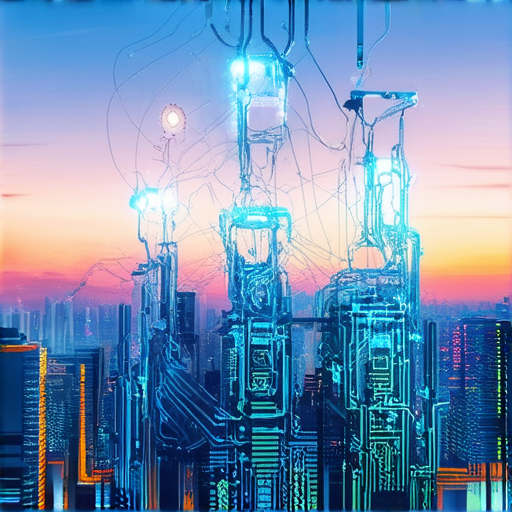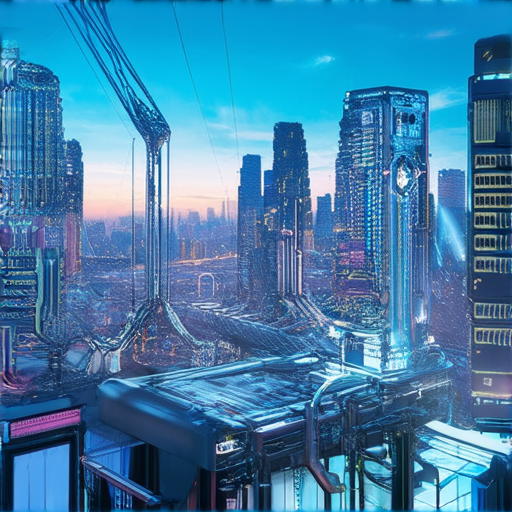The tech industry has been rapidly evolving over the years, driven by advancements in emerging technologies, shifting consumer behaviors, and increasing demand for digital solutions. As we navigate the complex landscape of the tech industry, it’s essential to stay informed about the latest trends, growth statistics, and innovations that are shaping its future. From artificial intelligence and cloud computing to cybersecurity threats and edge computing, there are numerous factors influencing the direction of the tech industry. In this comprehensive guide, we’ll delve into the top trends, explore their implications, and provide expert insights on what’s hot in tech right now, what’s next, and how companies can prepare for the future.

Trends in the Technology Industry
We’re living in an era of rapid technological advancement, and staying informed about the latest trends can help us navigate this complex landscape.
-
Artificial Intelligence (AI)
As we move into 2025, AI continues to play a significant role in shaping various industries, from healthcare to finance.
- Machine learning algorithms are becoming increasingly sophisticated, enabling businesses to make data-driven decisions.
- Natural language processing (NLP) is improving communication between humans and machines, leading to more efficient customer service experiences.
- The rise of edge computing is allowing for faster processing and reduced latency, making real-time applications possible.
-
Extended Reality (XR)
XR encompasses virtual reality (VR), augmented reality (AR), and mixed reality (MR), revolutionizing how we interact with information and each other.
- VR is transforming entertainment, education, and training, offering immersive experiences that simulate real-world environments.
- AR is enhancing daily life, from navigation and shopping to gaming and social interactions.
- MR is blurring the lines between physical and digital worlds, opening up new possibilities for collaboration and creativity.
-
Cybersecurity
As technology advances, cybersecurity threats are becoming increasingly sophisticated, making it essential for businesses and individuals to stay vigilant.
- Ransomware attacks are on the rise, highlighting the need for robust backup systems and incident response plans.
- Phishing scams continue to evolve, emphasizing the importance of employee education and awareness programs.
- The Internet of Things (IoT) is expanding, introducing new vulnerabilities that require proactive mitigation strategies.
By understanding these trends and staying ahead of the curve, we can harness the power of technology to drive innovation, growth, and positive change.
What’s Hot in Tech Right Now?
As we navigate the ever-evolving landscape of technology, it’s essential to stay informed about the latest trends and innovations.
- Artificial Intelligence (AI): From chatbots to predictive analytics, AI is transforming industries and revolutionizing the way we live and work.
- Cloud Technology: With the rise of cloud computing, businesses can now access scalable infrastructure, storage, and applications on-demand, reducing costs and increasing agility.
- Internet of Things (IoT): As IoT continues to grow, we’re seeing increased adoption in smart homes, cities, and industrial settings, enabling real-time monitoring, automation, and decision-making.
- Cybersecurity: As technology advances, cybersecurity threats evolve, making it crucial for organizations to invest in robust security measures, including encryption, firewalls, and incident response planning.
- Quantum Computing: The emergence of quantum computing promises to solve complex problems in fields like medicine, finance, and climate modeling, paving the way for breakthroughs and innovations.
- Sustainable Technologies: As concern for the environment grows, sustainable technologies like renewable energy, electric vehicles, and eco-friendly materials are gaining traction, driving a shift towards a greener future.
In today’s fast-paced tech landscape, staying ahead requires continuous learning, adaptation, and innovation. By embracing these emerging trends and technologies, we can unlock new opportunities, drive growth, and shape a better tomorrow.
Tech Jobs in High Demand
- Data Scientist: With the exponential growth of data, companies need professionals who can collect, analyze, and interpret complex data sets to inform business decisions.
- DevOps Engineer: As software development and deployment become increasingly complex, DevOps engineers play a critical role in bridging the gap between development and operations teams.
- Cloud Architect: With the rise of cloud computing, cloud architects design and implement scalable, secure, and efficient cloud-based systems for organizations.
- Cybersecurity Specialist: As cyber threats escalate, cybersecurity specialists develop and implement robust security measures to protect against attacks and breaches.
- Full Stack Developer: Full stack developers possess expertise in both front-end and back-end development, enabling them to build complete web applications and services.
Staying Ahead in the Tech Landscape
To remain competitive, it’s essential to continuously update your skills and knowledge in emerging technologies. Invest in online courses, attend conferences, and engage with industry leaders to stay informed and network with peers.
By embracing these trends and technologies, you’ll be well-positioned to capitalize on new opportunities, drive growth, and shape a brighter future in the world of tech.

The Next Big Thing in Tech
We’re living in an era of rapid technological advancement, and staying ahead of the curve requires a deep understanding of emerging trends.
- Generative AI: As we’ve discussed earlier, generative AI is poised to revolutionize various industries with its ability to create sophisticated and human-like content.
- Extended Reality (XR): XR encompasses virtual reality (VR), augmented reality (AR), and mixed reality (MR). These technologies are transforming entertainment, education, and healthcare.
- Cybersecurity: As our reliance on technology grows, cybersecurity threats become increasingly sophisticated. Staying ahead of these threats requires innovative approaches to security.
- Quantum Computing: Quantum computing has the potential to solve complex problems that are currently unsolvable with traditional computers.
- Sustainable Technologies: With growing concerns about climate change, sustainable technologies are becoming increasingly important. From renewable energy to eco-friendly materials, there are many exciting developments in this space.
- Artificial General Intelligence (AGI): AGI refers to AI systems that possess human-like intelligence and can perform any intellectual task. While still in its infancy, AGI holds tremendous promise for solving complex problems.
- Internet of Bodies (IoB): IoB involves implantable, wearable, or external devices that monitor and enhance human health. This technology has the potential to revolutionize healthcare.
- Autonomous Systems: Autonomous vehicles, drones, and robots are becoming increasingly prevalent. These systems have the potential to transform transportation, logistics, and manufacturing.
- Blockchain and Distributed Ledger Technology: Blockchain and distributed ledger technology offer secure, transparent, and decentralized ways to conduct transactions and store data.
- Nanotechnology: Nanotechnology involves the manipulation of matter on a nanoscale. This field has the potential to revolutionize materials science, medicine, and energy production.
- Biotechnology: Biotechnology involves the application of biological principles to develop new products and technologies. This field has the potential to transform healthcare, agriculture, and environmental sustainability.
- Neuromorphic Computing: Neuromorphic computing involves the development of computer systems that mimic the human brain. This field has the potential to revolutionize artificial intelligence and machine learning.
- Space Exploration: Space exploration continues to push the boundaries of human knowledge and ingenuity. From private companies like SpaceX to government-led initiatives, space exploration is an exciting area of growth.
- Advanced Materials: Advanced materials involve the development of new materials with unique properties. This field has the potential to transform industries ranging from aerospace to consumer goods.
- Energy Storage: Energy storage technologies, such as batteries and supercapacitors, are crucial for enabling widespread adoption of renewable energy sources.
- Smart Cities: Smart cities involve the integration of technology and infrastructure to create more efficient, sustainable, and livable urban environments.
- Personalized Medicine: Personalized medicine involves tailoring medical treatments to individual patients based on their unique genetic profiles and health needs.
- Robotics: Robotics involves the design, construction, and operation of robots. This field has the potential to transform industries ranging from manufacturing to healthcare.
- Virtual Assistants: Virtual assistants, such as Siri and Alexa, are becoming increasingly prevalent. These systems have the potential to revolutionize customer service and personal productivity.
- Edge Computing: Edge computing involves processing data closer to the source, reducing latency and improving real-time decision-making.
- 5G Networks: 5G networks offer faster speeds, lower latency, and greater connectivity than previous generations of wireless technology.
- Cloud Gaming: Cloud gaming involves streaming games from remote servers to local devices. This technology has the potential to revolutionize the gaming industry.
- Augmented Reality Contact Lenses: Augmented reality contact lenses have the potential to revolutionize the way we interact with information and each other.
- Brain-Computer Interfaces (BCIs): BCIs involve developing systems that enable people to control devices with their thoughts. This technology has the potential to transform healthcare and communication.
- Swarm Intelligence: Swarm intelligence involves the study of collective behavior in decentralized systems. This field has the potential to revolutionize fields ranging from finance to logistics.
- Metamaterials: Metamaterials involve the creation of materials with properties not found in nature. This field has the potential to transform industries ranging from aerospace to consumer goods.
- Graphene and 2D Materials: Graphene and 2D materials have the potential to revolutionize electronics, energy storage, and other fields due to their unique properties.
- Soft Robotics: Soft robotics involves the development of robots that can safely interact with humans and other delicate objects. This field has the potential to transform industries ranging from healthcare to manufacturing.
- Biodegradable Plastics: Biodegradable plastics involve the development of plastics that can easily decompose and return to nature. This field has the potential to reduce plastic waste and promote sustainability.
- Carbon Capture and Utilization: Carbon capture and utilization involve capturing CO2 emissions and converting them into valuable chemicals and materials. This field has the potential to mitigate climate change and promote sustainability.
- Advanced Desalination Technologies: Advanced desalination technologies involve the development of more efficient and sustainable methods for removing salt and other minerals from seawater. This field has the potential to provide clean drinking water for millions of people worldwide.
- Urban Agriculture: Urban agriculture involves the cultivation of crops in urban environments. This field has the potential to increase food security, reduce transportation costs, and promote sustainability.
- Waste-to-Energy Technologies: Waste-to-energy technologies involve the conversion of waste into energy. This field has the potential to reduce greenhouse gas emissions, promote sustainability, and provide a new revenue stream for waste management companies.
- Advanced Nuclear Power: Advanced nuclear power involves the development of safer, more efficient, and more sustainable nuclear reactors. This field has the potential to provide clean energy, reduce greenhouse gas emissions, and promote energy independence.
- Space-Based Solar Power: Space-based solar power involves collecting solar energy in orbit around the Earth and beaming it back to the planet as microwave beams. This field has the potential to provide clean energy, reduce greenhouse gas emissions, and promote energy independence.
- Advanced Water Purification Technologies: Advanced water purification technologies involve the development of more efficient and sustainable methods for removing contaminants from water. This field has the potential to provide clean drinking water for millions of people worldwide.
- Geothermal Energy: Geothermal energy involves harnessing heat from the Earth’s core to generate electricity. This field has the potential to provide clean energy, reduce greenhouse gas emissions, and promote energy independence.
- Advanced Biomass Conversion Technologies: Advanced biomass conversion technologies involve the development of more efficient and sustainable methods for converting biomass into energy. This field has the potential to reduce greenhouse gas emissions, promote sustainability, and provide a new revenue stream for farmers and foresters.
- Carbon Mineralization: Carbon mineralization involves the conversion of CO2 into stable solid minerals. This field has the potential to mitigate climate change, promote sustainability, and provide a new revenue stream for carbon capture and utilization companies.
- Advanced Hydrogen Production Technologies: Advanced hydrogen production technologies involve the development of more efficient and sustainable methods for producing hydrogen fuel. This field has the potential to reduce greenhouse gas emissions, promote sustainability, and provide a new revenue stream for energy companies.
- Electrochemical CO2 Reduction: Electrochemical CO2 reduction involves the conversion of CO2 into valuable chemicals and fuels using electrochemistry. This field has the potential to mitigate climate change, promote sustainability, and provide a new revenue stream for carbon capture and utilization companies.
- Advanced Biofuels: Advanced biofuels involve the development of more efficient and sustainable methods for producing biofuels. This field has the potential to reduce greenhouse gas emissions, promote sustainability, and provide a new revenue stream for farmers and foresters.
- Green Chemistry: Green chemistry involves the development of chemical processes and products that minimize harm to the environment. This field has the potential to reduce greenhouse gas emissions, promote sustainability, and provide a new revenue stream for chemical companies.
- Advanced Materials for Energy Storage: Advanced materials for energy storage involve the development of more efficient and sustainable materials for energy storage applications. This field has the potential to reduce greenhouse gas emissions, promote sustainability, and provide a new revenue stream for energy companies.
- Thermoelectric Materials: Thermoelectric materials involve the development of materials that can convert heat into electricity. This field has the potential to reduce greenhouse gas emissions, promote sustainability, and provide a new revenue stream for energy companies.
- Advanced Catalysts for Clean Energy: Advanced catalysts for clean energy involve the development of more efficient

The Future of the Tech Industry
As we navigate the rapidly evolving landscape of technology, several key factors will shape the future of the industry. Here are five major concerns that companies will need to address:
- Talent Acquisition and Retention: The boom in AI and other cutting-edge technologies will likely outpace the available talent pool, leading to fierce competition to attract and retain skilled professionals.
- Technological Advancements: Quantum computing, spatial computing, and other emerging technologies will continue to transform industries and create new opportunities for growth and innovation.
- Data Security and Privacy: As technology advances, the risk of cyber threats and data breaches will increase, making data security and privacy a top priority for companies.
- Sustainability and Environmental Impact: The tech industry will need to prioritize sustainability and reduce its environmental impact, driving innovation in eco-friendly technologies and practices.
- Regulatory Frameworks: Governments and regulatory bodies will play a crucial role in shaping the future of the tech industry, establishing frameworks that balance innovation with consumer protection and social responsibility.
To stay ahead of the curve, companies will need to invest in emerging technologies, develop diverse and inclusive workforces, and prioritize sustainability and social responsibility. By doing so, they can capitalize on the opportunities presented by technological advancements and create a brighter future for themselves and their customers.
Key Trends Shaping the Future of the Tech Industry
Some of the key trends that will shape the future of the tech industry include:
- Artificial Intelligence (AI): AI will continue to drive innovation and transformation across industries, from healthcare to finance and beyond.
- Internet of Things (IoT): The IoT will connect devices and systems, enabling greater efficiency, productivity, and innovation.
- Cybersecurity: Cybersecurity will become increasingly important as companies and consumers rely more heavily on digital technologies.
- Cloud Computing: Cloud computing will continue to grow in popularity, offering greater flexibility, scalability, and cost-effectiveness.
- Quantum Computing: Quantum computing will begin to emerge as a game-changer, enabling faster processing speeds and solving complex problems.
Preparing for the Future of the Tech Industry
To prepare for the future of the tech industry, companies will need to:
- Invest in Emerging Technologies: Invest in emerging technologies, such as AI, IoT, and quantum computing, to stay ahead of the curve.
- Develop Diverse and Inclusive Workforces: Develop diverse and inclusive workforces to tap into a broader range of perspectives and ideas.
- Prioritize Sustainability and Social Responsibility: Prioritize sustainability and social responsibility to reduce the industry’s environmental impact and promote positive social outcomes.
- Stay Agile and Adaptable: Stay agile and adaptable to respond quickly to changing market conditions and technological advancements.
Is Tech Recession Coming?
As we navigate the complexities of the modern economy, many are wondering whether a tech recession is looming on the horizon.
- The current economic landscape suggests a mixed bag of signals, with some indicators pointing towards a potential downturn and others hinting at continued growth.
- Economists have lowered the risk of a recession in 2024 to below 50%, according to recent forecasts.
Key Factors Influencing the Tech Sector:
- Digital Transformation: As companies continue to invest in digital transformation initiatives, the demand for tech services and solutions remains strong.
- Innovation and R&D: The tech sector is known for its innovative spirit, with many companies pouring significant resources into research and development.
- Sustainability and ESG: With growing concerns around environmental sustainability and social responsibility, the tech sector is under increasing pressure to deliver eco-friendly solutions.
Competitor Landscape:
While several players dominate the tech market, including Amazon Web Services (AWS), Microsoft Azure, and Google Cloud Platform (GCP), other notable competitors include IBM Cloud, Oracle Cloud, and Alibaba Cloud.
- AWS has established itself as a leader in cloud computing, offering a wide range of services and tools for businesses.
- MICROSOFT AZURE has made significant strides in recent years, expanding its offerings and improving its overall performance.
- GCP has gained traction among developers and enterprises alike, thanks to its scalable infrastructure and innovative features.
Outlook for 2024 and Beyond:
Despite the uncertainty surrounding a potential tech recession, many experts remain optimistic about the sector’s long-term prospects.
- Analysts predict a potential return to modest growth in 2024, followed by more robust prospects in 2025.
- The rise of emerging technologies like artificial intelligence, blockchain, and the Internet of Things (IoT) is expected to drive innovation and investment in the tech sector.
Conclusion:
In conclusion, while the possibility of a tech recession cannot be ruled out, the sector’s underlying drivers suggest a resilient and adaptable industry poised for continued growth and innovation.

Why Are Tech Companies Laying Off?
As we navigate the complexities of the modern economy, it’s essential to understand the reasons behind the recent surge in tech sector layoffs.
- Inflation and Increased Expenses
- Adapting to Market Shifts
- Consolidation and Mergers
- Skills Gap and Automation
With rising prices for services and goods, businesses have been forced to reevaluate their budgets and make adjustments to stay afloat.
One of the most significant cost-cutting measures involves reducing employee headcounts, which can help alleviate financial burdens and allow companies to allocate resources more efficiently.
The tech industry is notorious for its rapid evolution, with emerging trends and innovations constantly disrupting traditional business models.
To remain competitive, companies often need to adapt quickly, which may involve restructuring teams or eliminating positions to realign with changing market demands.
As the tech landscape continues to consolidate, smaller companies may struggle to compete with larger players, leading to potential layoffs and acquisitions.
This trend is particularly evident in the software development space, where consolidation has resulted in a decrease in available job opportunities.
The increasing adoption of automation technologies has created a skills gap in the workforce, making certain roles redundant and forcing companies to reassess their staffing needs.
This shift towards automation is expected to continue, potentially leading to further layoffs in industries where tasks can be easily automated.
At Iterati, we recognize the importance of staying informed about the latest developments in the tech industry, from digital transformation to sustainable solutions.
By understanding the underlying factors driving tech sector layoffs, we can better prepare ourselves for the challenges and opportunities that lie ahead.




0 Comments